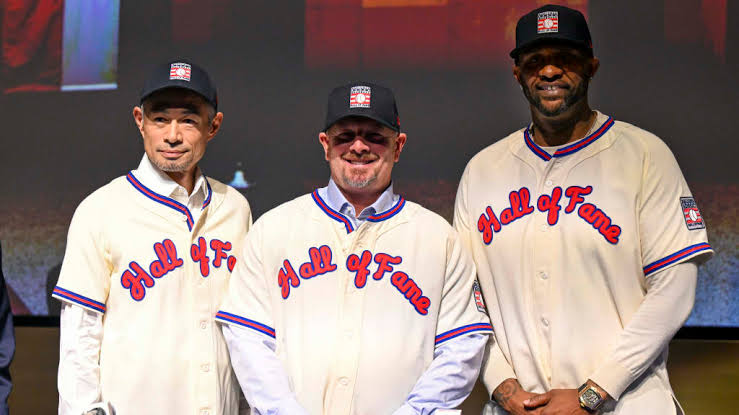

Baseball analyst and insider Ryan M. Spaeder has issued a bold call to action, questioning the standards for excellence used in sport’s most prestigious honors, the MVP and Hall of Fame voting. In a scathing critique, Spaeder argues that the processes behind these prestigious honors are deeply flawed, driven by outdated metrics, inconsistent criteria, and biases that fail to capture the true greatness of many players. His plea demands an overhaul to better align these awards with the realities of modern baseball.
Watch What’s Trending Now!
The MVP award, historically seen as the gold standard for individual performance, has repeatedly been awarded based on team success or voter bias rather than actual on-field contributions. He points to baffling decisions, such as giving the 1992 MVP to reliever Dennis Eckersley over position players with far greater statistical impact or passing over all-time great Ted Williams multiple times due to personal vendettas. These decisions, detractors argue, undermine the award’s credibility as a measure of individual achievement.
ADVERTISEMENT
Ryan M. Spaeder’s call to embrace modern standards in MLB
Hall of Fame selections fare no better under scrutiny. Many voters prioritize arbitrary benchmarks like 500 home runs or 3,000 hits while ignoring players with less traditional but equally impressive resumés. Ryan M. Spaeder gave Bobby Abreu as an example on X. “It seems that the strongest argument against Bobby Abreu as a Hall of Famer is, essentially, that his stats were so good that he collected them for a very long time. Do you realize how absurd this sounds?”
Abreu has faced dismissal despite elite career numbers like a .395 on-base percentage and over 400 stolen bases. Critics attribute this to his lack of flashy counting stats or MVP-caliber seasons, a metric they claim perpetuates a narrow view of greatness.
Top Stories
MLB Rumors: Diamondbacks’ $116.5M U-Turn Spoils Alex Bregman Market, Bo Bichette’s Blue Jays Return While Yankees Left Empty-Handed

Scott Boras Faces The Music for Cody Bellinger Free Agency Limbo As Yankees Reunion Fades Away

Phillies Confront Risky Bryce Harper Change to Make Bo Bichette Dream a Reality

Who Is Phillies’ Max Kepler? Net Worth, Contract, Parents, Girlfriend, Ethnicity & Suspension Explained

Massive Blue Jays Shakeup Incoming as Ross Atkins Refuses to Sacrifice Bo Bichette–Kyle Tucker, Deems Insider

It seems that the strongest argument against Bobby Abreu as a Hall of Famer is, essentially, that his stats were so good that he collected them for a very long time. Do you realize how absurd this sounds?
— Ryan M. Spaeder (@theaceofspaeder) January 24, 2025
ADVERTISEMENT
Spaeder also questioned the shifting standards applied by the Baseball Writers’ Association of America (BBWAA), the organization responsible for both MVP and Hall of Fame voting. While advanced analytics such as WAR and wRC+ have become widely accepted tools for evaluating players, some voters cling to outdated metrics, leading to inconsistent results. The same group that once shunned players like Tim Raines or Edgar Martinez for decades now retroactively celebrates their contributions after public outcry.
Spaeder’s plea goes beyond mere criticism; it outlines a clear vision for reform. He emphasizes the need for a more objective approach to evaluating players, urging the adoption of advanced analytics to provide a comprehensive understanding of value. Additionally calling for the elimination of biases that unfairly disadvantage nontraditional candidates, arguing that as baseball continues to evolve, so too must the systems.
ADVERTISEMENT
Why the System Must Change to Honor the Era
As baseball evolves, so too should the methods used to recognize its greatest players. Old measures such as home runs, batting averages, and RBIs aren’t enough anymore. As the game gets more complex, strategic WAR (Wins Above Replacement) wRC+ (Weighted Runs Created Plus) and defensive performance get commonly used to evaluate a player’s impact in baseball. However, for awards like MVP and HOF, voters continue to rely on outdated stats and storytelling conventions when making their decisions.
In 2021, Connor Grossman told Sports Illustrated, “It’s time to even the scales, opening up the vote to broadcasters, players and yes, fans, while allowing the writers to continue voting. Weigh each of those four slices however you would like, and that’s a vote that would be more representative of those who dedicate their lives to the game.”
ADVERTISEMENT
Today’s game celebrates versatility, with players like Shohei Ohtani showcasing exceptional talent both offensively and defensively. Yet, the recognition system remains stuck in outdated standards.
Will Laws even suggested, “We need a binary ballot; a simple yes or no choice for each player with no 10-player maximum to limit voters.”
In the end, to truly honor the era and its players, the system must evolve, embracing modern standards that highlight the multifaceted contributions of today’s stars.
ADVERTISEMENT
ADVERTISEMENT
ADVERTISEMENT
ADVERTISEMENT

